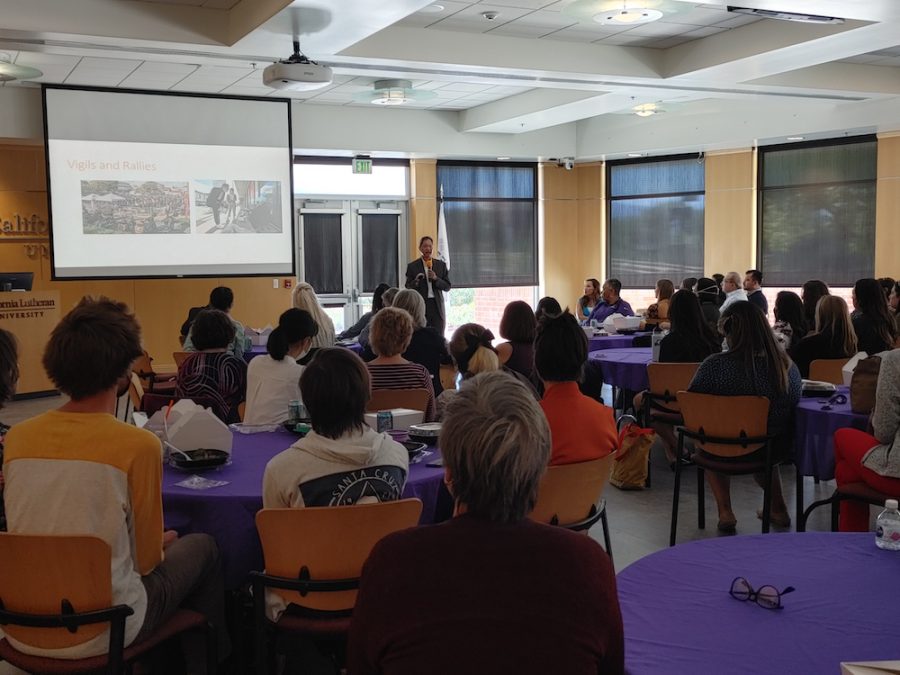Russell Jeung speaks at Stop Asian Hate panel
Photo by Will Haddock - Reporter
On Tuesday, April 19, 2022 Russell Jeung spoke at a panel about the importance of working to stop anti-Asian and anti-Asian American related hate.
April 25, 2022
On Tuesday, April 19 a Stop Asian Hate panel was held featuring Russell Jeung, who has a doctorate in sociology and is a professor of Asian American studies at San Francisco State University. The panel was put on by the Office of Talent, Culture and Diversity in the Lundring Events Center.
The panel ran from 11:30 a.m. to 1:00 p.m., included a free lunch, Jeung’s presentation, and a question and answer session after. Jeung later opened up the forum to hold a conversation with Asian American Pacific Islander students and faculty.
The panel began with an introduction from Cristallea Buchanan, vice president of Talent, Culture, and Diversity. Buchanan was aided by first year student Giovanna Postma.
Postma was involved with coordinating the event as well as putting together the AAPI month poster boards that have been around campus this month.
“I’m really glad we have this representation, and awareness right now on campus, it’s very important to be able to have those voices heard…the truth of it, and understanding, you know, the pain and suffering those groups also face,” Postma said.
Jeung’s presentation was centered around the quote “Be like water.” He began his speech with the four characteristics of water; clear, humble, persistent, and restorative.
“I think there’s four qualities of water that we need to embrace if we want to not only pursue racial justice, not only deal with the individual trauma that we’re experiencing, but also make an institutional change,” Jeung said.
In March of 2020, he created Stop AAPI Hate, a reporting center where, according to Jeung, people could submit incidents of racism of their experience.
“We created it because we knew from Asian American history that whenever diseases came from Asia, that Asians would be blamed,” Jeung said.
Jeung created a Stop AAPI reporting center where people could report any racist incidents. The reporting center also includes updated reports with data on national hate crimes against AAPI persons. According to a recent report from the Stop AAPI website, from March 19, 2020 to Dec. 31, 2021, a total of 10,905 hate incidents against AAPI persons were reported.
Jeung touched on trauma throughout the presentation, including the rise of hate crimes against AAPI persons since the beginning of the pandemic. Jeung brought up speakers to recount experiences of hate faced by eldery members of the AAPI community. Some of the incidents included blame for COVID-19, telling the victim to go back to their country, and violent behavior such as verbal harassment, slurs and violence.
When talking about how racism affects the Asian American community, Jeung said he believes in being humble like water and taking the path of least resistance.
“We as a society need to learn from water. And this is not that we don’t fight back against racism, that we as individuals need to be humble…because we have to recognize we’re just as suseptible to racism,” Jeumg said.
Jeung went on to discuss interpersonal racism and believes it is rooted in institutions. He noted that policies and rhetoric from politicians has also had an impact on the rise of AAPI hate crimes. He noted how legislation blocked Chinese doctors from working in the U.S. and placed tighter restrictions on immigration.
Jeung said he believes that politicians such as former U.S. President Donald Trump using terms such as “kung flu” and “china virus” affected how people viewed Asian Americans. One example in his presentation included slides of a COVID-19 themed party held at a college with a racist caricature of a Chinese man in a mask.
“When people hear the term ‘Chinese virus’, when they see representations like this, again, it shapes our stereotypes, it shapes how we automatically respond to our perceptions,” Jeung said.
The rest of Jeung’s presentation touched on historic racism in cities like San Francisco during the time of Polio, or the Japanese Internment camps during World War II. He also touched on how educational equity and non-violence as well as media portrayal are the most effective ways to fight back against anti-AAPI racism.
“We need to find nonviolent ways to restore our communities rather than just isolating ourselves…and so we’re pushing for ethnic studies as a way to unlearn racism to require at the K to 12 level because we need to address the racial divides,” Jeung said.



